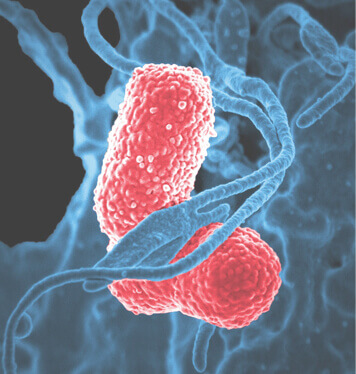In a word: Yes.
Blood Clean Up Services
Blood. We live because blood provides us with the nutrients and oxygen needed to survive. Blood can also carry dangerous pathogens that have serious and even fatal consequences upon exposure.


Blood. We live because blood provides us with the nutrients and oxygen needed to survive. Blood can also carry dangerous pathogens that have serious and even fatal consequences upon exposure.
Eco Bear Biohazard Cleaning Company is a woman-owned, veteran-led biohazard cleaning company serving California, Nevada, and Arizona. Our rates are typically 50% lower than our competitors.
Because of this very real potential duality, if you encounter a situation involving the need for a blood cleaning service, you need to know when seeking professional assistance from a blood cleaning company is necessary.
Apply this simple test when determining whether or not you require the services of a blood cleaning company:
If the blood that needs to be cleaned up consists of an amount larger than a dinner plate seek professional assistance.
Keep this important warning in mind:
Even if you are faced with cleaning up a small amount of blood, you must follow the safety procedures and utilize the personal protective gear which is discussed in a moment. (The only exception is if you are cleaning up your own blood following some sort of minor mishap.)
Keeping in mind the “professional blood cleanup test” just referenced, there are specific circumstances that demand the intervention of a blood cleaning company. Dangerous pathogens biohazardous pathogens can exist even when only trace amounts of blood are present.
In addition, traumatic situations occur that warrant the intervention of a professional blood cleanup company for your own emotional wellbeing.
The most common situations in which professional biohazard cleanup are needed include the aftermath of:
The National Institutes of Health defines a bloodborne pathogen as:

According to the American Red Cross, bloodborne pathogens spread in one of four different ways:
In a word: Yes.
Some bloodborne pathogens are more dangerous than others. In fact, the scale of harm potentially caused by different types of bloodborne pathogens range from milder illness to death.
The U.S. Centers for Disease Control and Prevention classify biohazards in five levels. Biohazard cleanup typically is concerned with remediating pathogens found in Level Three and Level Four. The problem is, until blood or other matter is tested, you have absolutely no way of knowing what types and severity of pathogens may be contained in blood, bodily fluids, or other biological materials. The CDC classification is:
In the United States, there are four different types of dangerous infections that are caused by bloodborne pathogens. These are:
HIV is the virus that can result in AIDS. Once infected by HIV, and if left untreated, the virus (technically a retrovirus) will attack what are known as CD4 of T cells in the body. These calls are vital in fighting off various diseases and infections. If left untreated, the loss of T cells can reach a point at which a person is diagnosed as having AIDS. The most common method of transmission of HIV in the United States is sexual contact with an infected partner. It can also be transmitted via infected blood, like that found in the aftermath of a traumatic accident or some other event that resulted in a loss of blood.
Hepatitis C also caused a liver infection. Left untreated, hep C can cause serious liver damage and even cancer. Many people exhibit no symptoms of this infection. Symptoms may not appear for years and not until significant damage has been done to the liver. There is no vaccination for this type of hepatitis. It is the single most common chronic bloodborne infection in the United States. One in 30 Baby Boomers are said to be infected with hep C.
A vaccine does exist for hepatitis B. Absent being vaccinated, and upon exposure to the virus, a person can experience a liver infection. Hep B is considered an acute illness for most people. What this mean is that once exposed and infected, the infection resolves itself. A small number of people develop chronic (or more long term) hep C. A chronic case, left untreated, can result in liver damage.
MRSA stands for Methicillin-resistant Staphylococcus aureus. This infection results from a strain of staph bacteria that is highly resistant to a variety of different types of antibiotics. In other words, if you end up infected with MRSA, it can prove to be very difficult to treat. Bear in mind that are people who carry the MRSA infection and have no symptoms. They can unknowingly transfer the infection.
A professional blood cleaning company generally uses a process that involves four steps:

The initial stage of blood cleanup, or of any biohazardous remediation, involves that actual cleaning and removal of contamination at the site. This includes the cleanup of:
This step in the process also involves addressing items on the premises that have been contaminated by blood, bodily fluids, and other biological materials. Depending on the circumstances, including the location of the contamination, these items very well may include:
These contaminated materials, together with anything disposable used in the cleaning process, must be properly disposed of.
Following the thorough elimination of blood, bodily fluids, other biological matter, and contaminated items, sanitization occurs. The sanitization of the scene requires the use of medical grade chemicals that a professional blood cleaning company can obtain. These sanitization agents are what hospitals utilize to control the spread of dangerous pathogens. They are far stronger than the types of cleaning and antibacterial products you can purchase at the store.
The third stage of the blood cleaning process is deodorization. A professional blood cleaning company utilizes commercial grade deodorizing chemicals and approved equipment for this process. As is the case with sanitization chemicals, these are not items available to you at the local store. The deodorization process cannot be understated, particularly after a situation like an unattended death. Deodorization addresses the seriously negative consequences even a somewhat faint, and yet lingering, the odor can have on a home or place of business:
The ultimate goal of a professional blood cleanup and biohazard remediation company is to restore a home to a habitable condition. If the premises are a place of business, the objective is to ensure that the property is fully usable going forward.
Prompt intervention by a blood cleanup company lessens the damage to a home and limits the potential exposure from biohazards. In addition, the day may come when you want to sell your home. The failure to obtain professional blood cleaning assistance may have the ultimate outcome of lowering the market value of your residence.
The U.S. Centers for Disease Control and Prevention developed universal precautions for dealing with any contact with blood. These universal precautions apply to you and to a blood cleaning company called in to undertake what technically is known as biohazard remediation. Biohazard remediation is the cleanup, sanitization, and restoration of a site that has been contaminated with blood, bodily fluids, and other biological materials. The universal precautions promulgated by the CDC are:
The person safety of any person engaged in blood cleanup is a paramount consideration. As has been discussed, the risks and dangers associated with cleaning up blood can be serious, even deadly. Proper personal protective gear or PPE is specialized gear that must be utilized by a person engaged in blood cleaning.
The reality is that consumers, people like you, do not have easy access to PPE. You can find equipment and gear that is like PPE. However, it may not meet the established standards necessary to provide you with appropriate protection when in contact with blood, bodily fluids, and other biological materials. A professional blood cleaning company (or biohazard remediation service) does have access to approved PPE.
In some cases, necessary PPR may also include head and show coverings, depending on the circumstances.
Odds are that if you have a situation in which a good amount of blood needs to be cleaned up, a traumatic event of some type has occurred in your home. Such an event may have included a crime, like an assault or even a homicide. You may have lost a loved one due to suicide. A loved one may have experienced an unintended death, a passing that was not immediately discovered.
While these are difficult situations to read about, they are even more emotionally wrenching to face. Understanding this reality, you need not heighten the loss, grief, and pain you very well may be experiencing at this time by personally undertaking the task of cleaning up after a truly traumatic event.
A professional blood cleaning company will provide the remediation and restoration help you need – in a compassionate, caring, and private manner. This permits you the ability to focus on more important issues like being with your family and supporting your loved ones in what may be a difficult time for you all.
Fill out the form to get a quote over the phone from a trained intake coordinator at Eco Bear Biohazard Cleaning Company.
orOR
Email us using the form below to get a quote.
We value privacy. All information shared with us is 100% confidential.
Call Us Today
(818) 358-4359